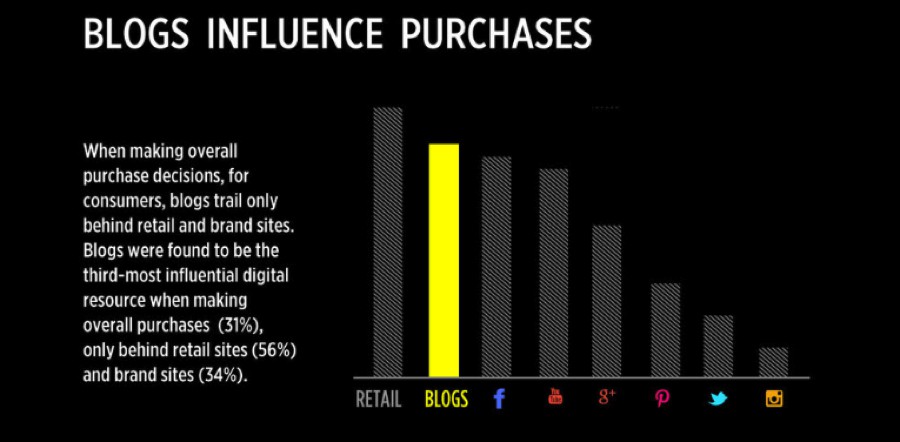It was way back in the stone age of the internet, well January 1996 at least, when Bill Gates wrote the first article claiming that “Content is King”. He began his article by stating that “Content is where I expect much of the real money will be made on the internet, just as it was in broadcasting”. Time has, of course, proven his statement to be very prophetic.
Nearly 20 years later in 2015, The Shelf created an infographic proclaiming that Influencer Marketing is the New King of Content. It may only be two years since they created that infographic, but there are clear signs that influencer marketing is indeed the new content king. All statistics in this post are quoted from The Shelf’s infographic.
Why Influencer Marketing is the New Content King:
- Influencer Marketing vs Content Marketing
- Why Does Influencer Marketing Work?
- A Common Sequence Taken by Online Consumers
- Influencer Marketing is an Integral Part of Content Marketing
- Who Takes Notice of the Influencers?
- The Importance of Quality Content for Influencer Marketing
- Control Over Content
- Why Do Brands Trust Influencers With Their Content Distribution?
Influencer Marketing vs Content Marketing
Content Marketing involves the creation and distribution of relevant and valuable content, designed to attract and engage an audience, with the ultimate aim of leading the reader to take some profitable customer action such as buying a product. While content marketing does include the content distribution process, that is just one stage and not its main focus.
Influencer Marketing, on the other hand, involves working with some prominent person in a particular market niche to distribute content - which again has the same ultimate aim of encouraging an online consumer to take a course of action. Influencer marketing may include content creation, but more often than not, it focuses more on the distribution of content than the creation of it.
The two types of marketing work hand-in-hand, and often brands use influencer marketing to promote content they created as part of their content marketing strategy. Content marketing is all about creating the perfect content to attract potential customers. Influencer marketing is all about taking the perfect content and finding the best method to disseminate it.
No matter how good content may be it will go unread or unwatched if nobody promotes it cleverly. Influencer marketing is a method brands can use to ensure that the right people are reading their content.
Why Does Influencer Marketing Work?
The key to understanding the recent success of influencer marketing is trust. Consumers trust influencers more than they do brands.
We are long past the time when people believed everything they saw online. There was a time, probably even before Bill Gates wrote his “Content is King” article, when the prevailing view was “if it’s online then it must be true”.
It didn’t take too many Nigerian money laundering scams and spam emails promising the earth (or at least a significant portion of it in return for your bank account number) for people to become cynical about what they read or saw online. Nowadays it is not enough for a brand to simply claim that their product is good. Consumers now require some form of independent proof.

Source: theshelf.com
Although many people do end up on a brand or retailer’s site when researching to buy a product - according to The Shelf’s infographic 56% of online shoppers go to retail sites and 34% go to brand sites - this is often their last point of call. They will often have already done their research before ending up at the retailer or brand site, with 31% of online buyers checking out reviews and other content related to their purchases on blogs, and sizeable percentages of potential buyers also finding out potential purchases on their social media channels.
When planning to buy something, potential consumers first turn to their favorite bloggers, YouTubers and trusted social media personalities. They turn to people they trust online for advice. They turn to people who they believe in enough to influence their purchasing decisions, i.e they turn to influencers.
A Common Sequence Taken by Online Consumers
- A consumer receives a recommendation about some product or service in a social media post or status that piques their attention.
- They want to learn more, so they go to their favorite blog / YouTube channel / podcast to see what else they can find out. They actively engage with relevant quality content.
- They seek final clarification about features, pricing, availability and shipping details by going to the brand’s own site or a retailer’s site.
- They purchase the product or service, either online at the brand / retailer site, or by going into a physical store.
Influencer Marketing is an Integral Part of Content Marketing
If you are a very big brand, with a highly active social media account, you may be able to rely on content marketing alone. With its 57 million Facebook followers, Coca-Cola can probably consider itself an influencer in its own right. Red Bull, likewise has built up its content marketing (using action videos – their YouTube channel has nearly 6,000,000 subscribers) to the point where it must be considered a leading influencer in its niche.
The vast majority of firms, however, are not in such a privileged position. Most brands would have no more than a few thousand followers on their social media accounts. No matter how good the content they produce, their effectiveness will always be limited by the size of their following.
These businesses need people with higher followings to share their content with a much wider audience for their content marketing to be successful. They need to engage in influencer marketing for their content marketing to be seen.
This is why influencer marketing is the new content king. It is the only way that most online content can be presented to brands’ target consumers.
Who Takes Notice of the Influencers?
The key advantage of influencer marketing is that it gets its timing better than most forms of marketing. It is not “hope marketing” like most traditional marketing, which is unleashed on the world in the hope that somebody will take notice of it. Influencer marketing works on the basis that there is already a captive audience.
The people who take notice of social media posts made by influencers are:
- Likely to be interested in your product if you’ve selected an influencer in the right niche because they wouldn't be following the influencer if they weren’t also passionate about that niche
- Trusting of any recommendations made by the influencer, because the influencer has already made the effort to build up relationships with his or her followers
- Actively reading/watching/listening to the influencer’s posts, so they are highly likely to see the influencer’s recommendation of your product
The Importance of Quality Content for Influencer Marketing
Influencer marketing is not just about distribution. Influencers would rapidly lose their support base if they simply redistributed traditional advertising material. They need high-quality content to use for their posts.
Much of the material promotes links back to blogs, sometimes those of the brands, sometimes those of the influencers’, and sometimes the blogs even belong to relevant third parties.
Interestingly, the same blog post can provide vastly different results, depending on who has promoted it. Content shared through influencers has been shown to have 3-10 times the conversion rate compared to content solely promoted by brands themselves.
In some cases, the influencers themselves make the content. This makes sense. They know their people better than anybody. They know what is popular with their fans and what leaves their followers dissatisfied and disinterested.
Control Over Content
It is important to realize, however, that when an influencer creates his own material, the brand is giving up a level of control over it. This is why it is so important for brands to do their homework when selecting influencers. Disney clearly didn’t have much of an idea of PewDiePie’s content when they worked with him - his target audience, and the content he shares with them, hardly match Disney’s family-friendly image. Is it any surprise that they eventually parted company acrimoniously?
Brands do have to realize that even when influencers share company-supplied content, they are likely to adapt it to suit their audiences. To some extent, brands engaging in influencer marketing lose control over their content. They definitely can’t micromanage its use.
That is not necessarily a bad thing, however. Influencers have earned the right to be considered experts in their space, and they often have the best knowledge of what will and what won’t work.
This should not be a problem for a business that has selected the correct influencer for their brand’s marketplace. Firms pitching product at PewDiePie's target market (“edgy”, rebellious teenage males between 13 and 16) should know that this group is hardly PC, and therefore his videos are unlikely to be either. Similarly, Bassmaster (@BASS_nation) is considered the most influential fishing account on Twitter. A firm pitching makeup to teen girls is unlikely to trust its content distribution to Bassmaster.
Why Do Brands Trust Influencers With Their Content Distribution?
There are quite a few solid reasons for firms to engage influencers to spearhead the distribution component of their content marketing, and even produce some content themselves:
- Influencers already have the visibility to create brand awareness, often without needing the resources that a brand itself would normally have to provide for the same effect
- Influencers can be great for educating people how they can use your product, particularly if it is unusual, complex, or just plain “different”
- They can show potential customers ways in which a product can be used
- When brands work with influencers they can create links which will help the brand with SEO for their website
- Some brands use influencers simply to increase their own social following, hoping that some of the influencers’ followers will also follow and interact with them
- If a brand has struck a problem in the marketplace they can use influencers to help with damage control as part of a reputation management program.
- Influencers can help lead to an increase in customer reviews and endorsements. This is very important nowadays, with online shoppers, in particular, swayed by online reviews and ratings
- When brands allow influencers to create their content, they are seen as more trustworthy, than brands that keep a strict rein on publishing brand-friendly content, and try to restrict any conflicting the official line
Overall, influencer marketing and content marketing work together in a partnership. Influencer marketing is the new content king.


